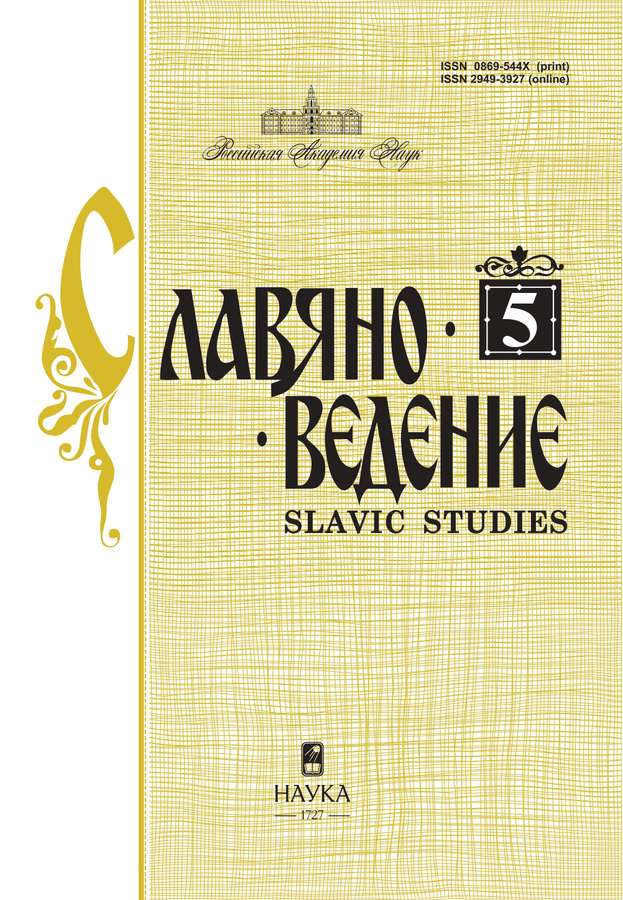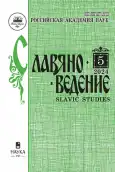№ 5 (2024)
Статьи
Варшавское генерал-губернаторство как транзитное направление эмиграции из Российской империи в конце XIX – начале ХХ века
Аннотация
Варшавское генерал-губернаторство служило ключевой территорией на маршруте нелегальной эмиграции из Российской империи, ставшей на рубеже XIX–XX вв. значимой государственной проблемой. На основе дореволюционного законодательства и широкого круга делопроизводственных документов из архивов России и Польши в статье рассматриваются особенности пересечения государственной границы в пределах Варшавского генерал-губернаторства вплоть до начала Первой мировой войны. Близость к германским портам на Балтике, существование разветвленных сетей эмиграционных контор, сложность легального выезда, отсутствие природных барьеров и неудовлетворительное состояние охраны границы обусловили выбор большинством эмигрантов нелегального перехода именно в этом регионе. Власти Российской империи разработали систему норм, регулирующих пограничный режим в Варшавском генерал-губернаторстве. Установленные для упрощения трансграничных контактов правила служили на руку тем, кто, выдавая себя за жителей приграничной полосы, незаконно переправлялся за рубеж. Попустительство должностных лиц способствовало этому. Местное население также включалось в организацию нелегальной эмиграции, помогая снабжать желающих документами на право выезда из империи.
 5-18
5-18


Подходы греко-католического митрополита Андрея Шептицкого к национально-конфессиональным вопросам в начале ХХ века
Аннотация
В статье рассматриваются подходы греко-католического митрополита Андрея Шептицкого к национально-конфессиональным вопросам в начале ХХ в. в контексте представлений его современников, как соратников, так и деятелей, имевших иную национальную и/или конфессиональную опцию. Путем анализа текстов митрополита Андрея выявлены свойственные ему взгляды на христианский мир и его ветви (католики разных обрядов, православные, особо – русские православные и старообрядцы, протестанты). Раскрыты отдельные особенности христианского универсализма в интерпретации Шептицкого, в том числе понятие «христианский народ» как одно из проявлений христианского мира на национальном уровне. В заключении делается вывод о том, что важнейшим приоритетом в деятельности митрополита Андрея было стремление к объединению всех христиан. У него имелось представление о том, как мог бы развиваться этот процесс. Главная роль отводилась Русской православной церкви, которой надлежало, по его мнению, осознать свое единство с Католической церковью.
 19-31
19-31


Евроинтеграция в программах чешских парламентских партий левого крыла в 1990–2010-е годы
Аннотация
В статье представлены результаты сравнительно-исторического анализа внешнеполитических разделов программ Чешской социал-демократической партии и Коммунистической партии Чехии и Моравии с привлечением документов их текущих архивов. Особое внимание в подходах двух партий уделено вопросам интеграции Чехии в структуры НАТО и Европейского союза. На основе изучения имеющейся научной литературы сделан вывод о необходимости рассматривать данную проблему сквозь призму двух основных направлений в контексте евроинтеграции: политики безопасности и экономического сближения с ЕС. Выявлены принципиальные различия в трактовках чешскими социал-демократами и коммунистами перспектив вхождения их страны в европейские и евро-атлантические объединения. Если социал-демократы отстаивали необходимость «вхождения в Европу» и даже в ее «ядро», видя в этом существенную пользу для экономики страны благодаря свободному перемещению рабочей силы, защите от валютных кризисов, а также снижению транзакционных издержек, то коммунисты призывали сохранять установку на многовекторность внешней политики государства – сотрудничество со всеми странами, представлявшими для Чехии интерес. В то же время обе партии, хотя и с разной степенью интенсивности, прибегали к критике европейских институтов. Результаты исследования позволяют выявить причину, по которой крупные чешские партии левого крыла проиграли выборы в нижнюю палату парламента ЧР в 2021 г.
 32-45
32-45


Драматургия А.Н. Островского в Словакии
Аннотация
В статье рассматривается история знакомства словацкой литературной культуры и театра с творчеством великого русского драматурга А.Н. Островского. Подробно рассказывается о первых переводах его пьес на словацкий язык и первых опытах постановок на профессиональной сцене (все они связаны с именем режиссера Я. Бородача), о сложностях перевода некоторых названий пьес, а также прослеживается эволюция восприятия творчества Островского в Словакии за прошедшее столетие. Выделяются периоды наибольшей популярности его пьес (1950-е, 1970–1980-е годы), дается обзор самых значительных словацких театральных постановок по его произведениям. Особое внимание уделяется нескольким выдающимся постановкам драмы «Лес» в разные исторические периоды, во многом повлиявшим на восприятие этого русского автора словацким зрителем: спектакли театра «Дивадло на корзе» (1971, реж. В. Стрниско), Театра СНП в Мартине (1982, реж. Л. Вайдичка), театра «Асторка Корзо ’90» (1997, реж. Р. Полак), Словацкого камерного театра в Мартине (2014, реж. Л. Брутовский, М. Дахо), Театра Я. Паларика в Трнаве (2020, реж. В. Стрниско).
 46-63
46-63


К юбилею Жанны Жановны Варбот
Жанна Жановна Варбот
 64-66
64-66


«Этимологический словарь славянских языков. Праславянский лексический фонд»: проект, разработка, состояние, проблемы, решения
Аннотация
В статье освещаются важные аспекты работы над «Этимологическим словарем славянских языков» (ЭССЯ), грандиозным проектом, основанным на концепции выдающегося лингвиста академика О.Н. Трубачева. Описывается контекст возникновения и развития идеи создания уникального словаря, формулируются основные принципы реконструкции праславянского лексического фонда, положенные в его основу. Первоначальный замысел предполагает этимологизацию не только литературной, но и других страт всех славянских языков (историческая, диалектная и жаргонная лексика). Обозначаются насущные проблемы в мировой этимологической науке (кадровые, финансовые), которые испытывает и коллектив ЭССЯ, в силу которых он вынужден немного отступать от первоначального замысла. Однако основная задача остается неизменной, проблемы решаются путем ограничения праславянских производных третьей ступени и некоторых поздних образований славянских языков.
 67-78
67-78


обидѫ сътворити или обидҍти? О месте глагольных перифраз с семантикой ‘причинение вреда’ в старославянском лексическом инвентаре
Аннотация
Статья посвящена изучению старославянских глагольных перифраз. Понятие «глагольная перифраза» восходит к представлениям Шарля Балли, впервые обратившего внимание на глагольные перифразы, выделив их во французском языке среди фразеологических сочетаний. Однословные греческие глаголы в оригиналах старославянских текстов могут передаваться при переводе как однословными старославянскими глаголами, так и глагольными перифразами. В статье представлен анализ употребления в старославянских текстах однословных глаголов и глагольных перифраз в рамках небольшой тезаурусной греческо-старославянской группы с семантикой ‘причинение вреда’. Греческие однословные глаголы действительного залога с семантикой ‘причинение вреда’ могут передаваться глагольными перифразами с глаголами творити, сътворити, дэяти, перифразы с глаголами приѩти, приимати служат для передачи форм глагольной парадигмы тех же самых греческих однословных глаголов, но форм медиопассивных. Роль информативно восполняющих зависимых слов выполняют «старые» славянские лексемы обида, врэдъ, пакость, напасть, огавиѥ, унаследованные, скорее всего, из праславянского. Представленный материал свидетельствует, что глагольные перифразы с семантикой ‘причинения вреда’ не были результатом фразеологического калькирования греческих или латинских образцов, а были образованы на собственно славянской почве.
 79-91
79-91


Праславянское *rъtъ: реконструкция семантики и этимология
Аннотация
Как о семантике, так и об этимологии праславянского слова *rъtъ был выдвинут целый ряд противоречащих друг другу гипотез. В статье подробно анализируются эти гипотезы. Доступный автору материал славянских письменных памятников и диалектов указывает на то, что древнейшим значением *rъtъ, вероятно, было ‘морда животного’. Среди этимологических гипотез наибольшего внимания заслуживают следующие: а) *rъtъ восходит к праиндоевропейскому *rutós, причастию от глагола *ruH- (> праслав. *ryti); б) *rъtъ является собственно праславянским дериватом от *ryti ‘рыть’, построенным по образцу модели *plyti ‘плыть’ : plъtъ ‘плот’; в) *rъtъ родственно глаголу *rypati. Согласно приведенным в статье аргументам, наиболее вероятной выглядит вторая из этих гипотез.
 92-110
92-110


«Память славян в словах»: К юбилею Ж.Ж. Варбот
Аннотация
Сообщение приурочено к юбилею известного российского этимолога, профессора Жанны Жановны Варбот, в нем анализируется четвертая книга ученого «Память славян в словах. Этимологические этюды». Отмечаются многочисленные достоинства труда, который включает статьи, объединенные в тематические разделы, например, «Семантика в этимологии», «Реконструкция и этимологизация праславянской лексики», «Этимологизация славянской лексики», «Этимологизация русской лексики». Среди статей есть и публиковавшиеся ранее в разных изданиях. Красной нитью в книге проходит мысль об особом значении диалектной лексики для выяснения происхождения слов, в частности, большое внимание автор уделяет русским диалектизмам, нередко играющим, как было показано на примерах, ключевую роль в этимологизации славянских слов и демонстрирующих их общеславянский характер. В отдельных случаях выдвигаемая автором этимология кажется дискуссионной, поэтому было предложено альтернативное мнение, например, для слов: болг. смùне са или славон. šetrica.
 111-120
111-120


Из истории славистики
К столетию историка-полониста: Владимир Александрович Якубский
Аннотация
Статья посвящена видному отечественному историку, специалисту по истории Польши В.А. Якубскому (1924–2013). В контексте общей характеристики творческого наследия ученого показана четкая взаимосвязь между его социально-экономическими изысканиями и наблюдениями над общим ходом польской истории, включая наиболее дискуссионные вопросы. Подчеркнут вклад В.А. Якубского, совместно с Г.Е. Лебедевой, в создание коллективного портрета-образа кафедры истории Средних веков Ленинградского университета, в историографию истории отечественной полонистики. Особо акцентировано, что участие В.А. Якубского в претворении в жизнь крупных академических исследовательских проектов выступало свидетельством неразрывных научных связей ленинградской/петербургской славистики со славистикой московской.
 121-135
121-135


Один из основоположников отечественной унгаристики. К 100-летию со для рождения В.П. Шушарина
Аннотация
В статье прослеживается творческий путь видного советского/российского медиевиста, специалиста по истории средневековой Венгрии и русско-венгерских отношений, а также по истории Трансильванского княжества в раннее Новое время В.П. Шушарина (1924–1999). Дефицит специалистов в этой отрасли знания способствовал тому, что В.П. Шушарину приходилось много времени уделять написанию глав в коллективных монографиях, где затрагивались проблемы истории Венгрии и Трансильвании в IX–XVII вв. Главным же трудом его жизни стало создание трехтомной этнической истории венгерского народа в названное время. Результаты исследований В.П. Шушарина были признаны не только отечественными, но и венгерскими коллегами-медиевистами.
 136-145
136-145


Рецензии
Распад Югославии: тридцать лет спустя / отв. ред. и сост. С.А. Романенко. М.: ИНИОН РАН, 2024. 327 с.
 146-149
146-149


Научная жизнь
Международная научная конференция «I Широковские чтения»
 150-153
150-153


Некрологи
Памяти Вячеслава Тимофеевича Середы (1951–2024)
 154-156
154-156













